![[ PACING THE VOID ]](http://wc.arizona.edu/images/void_button.gif)

(Make sure to read Part Two of Pacing the Void
Bryan Hance's interview with Jayne Loader)
![]() Remember the Bomb? You know, the weapon with all the weird nicknames - the Nuke, the Big Firecracker, the Deterrent?
Remember the Bomb? You know, the weapon with all the weird nicknames - the Nuke, the Big Firecracker, the Deterrent?
![]() No? Don't feel bad. I can't remember the last time I heard anyone yelling about the Bomb, and I live on a college campus. Obviously, we lost our greatest nuclear threat when the Soviet Union went under. Russia can't get the economy or the phones working,
let alone the Bomb, and it seems that we've swept the last 30 years' worth of nuclear hype under the rug.
No? Don't feel bad. I can't remember the last time I heard anyone yelling about the Bomb, and I live on a college campus. Obviously, we lost our greatest nuclear threat when the Soviet Union went under. Russia can't get the economy or the phones working,
let alone the Bomb, and it seems that we've swept the last 30 years' worth of nuclear hype under the rug.
![]() So where did our Nuclear Fear go? Have we completely forgotten what it's like to live with the pesky little Atom?
So where did our Nuclear Fear go? Have we completely forgotten what it's like to live with the pesky little Atom?
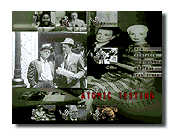
![]() Hardly. As Jayne Loader, appropriation artist and co-director/producer of the 1982 film classic "The Atomic Cafe", shows us in her forthcoming Public Shelter CD-ROM, there's more to Nuclear Fear than waiting for the Bomb to go off. Try nuclear was
te and your own government's ignorant blunders, to name a few.
Hardly. As Jayne Loader, appropriation artist and co-director/producer of the 1982 film classic "The Atomic Cafe", shows us in her forthcoming Public Shelter CD-ROM, there's more to Nuclear Fear than waiting for the Bomb to go off. Try nuclear was
te and your own government's ignorant blunders, to name a few.
![]() I know what you're thinking, but Public Shelter doesn't consist of rehashed hippie rantings about the Bomb and Mother Earth. Rather, it mixes archival footage from the Bomb's heyday with a huge multimedia database and some downright eerie artwork into a
captivating snapshot of all things nuclear.
I know what you're thinking, but Public Shelter doesn't consist of rehashed hippie rantings about the Bomb and Mother Earth. Rather, it mixes archival footage from the Bomb's heyday with a huge multimedia database and some downright eerie artwork into a
captivating snapshot of all things nuclear.
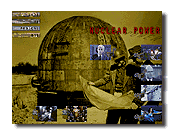
![]() Public Shelter takes "The Atomic Cafe" into the next stage of presentation, says Loader. Thankfully though, Public Shelter isn't just an attempt to reverse engineer the film onto a CD. A transition to multimedia begs for a massive amount of new content a
nd an engaging presentation, something Loader and EJL Productions managed to pull off so smoothly so that they picked up two
New Media INVISION awards at the 1996 June COMDEX in Chicago.
Public Shelter takes "The Atomic Cafe" into the next stage of presentation, says Loader. Thankfully though, Public Shelter isn't just an attempt to reverse engineer the film onto a CD. A transition to multimedia begs for a massive amount of new content a
nd an engaging presentation, something Loader and EJL Productions managed to pull off so smoothly so that they picked up two
New Media INVISION awards at the 1996 June COMDEX in Chicago.
![]() "I think it was the next logical step," Loader says of the move into multimedia, noting the diversity of information that went into the disk. "Where 'The Atomic Cafe' is strictly about the atomic bomb in the United States during the Cold War, Public Shel
ter is about the bomb, plus nuclear power and nuclear waste, and covers the international scene, extending to the present day," she said in a recent on-line interview.
"I think it was the next logical step," Loader says of the move into multimedia, noting the diversity of information that went into the disk. "Where 'The Atomic Cafe' is strictly about the atomic bomb in the United States during the Cold War, Public Shel
ter is about the bomb, plus nuclear power and nuclear waste, and covers the international scene, extending to the present day," she said in a recent on-line interview.
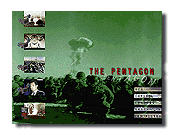
![]() That sounds like a lot of information, and it is. Public Shelter derives much of it's content to newly de-classified government documents pertaining to U.S. nuclear history. Such documents range from benign historical errata to the truly sinister, such a
s the paperwork detailing government-sponsored radiation experiments on unsuspecting Americans, some of them children. Public Shelter, then, arouses your curiosity as well as a sense of horror.
That sounds like a lot of information, and it is. Public Shelter derives much of it's content to newly de-classified government documents pertaining to U.S. nuclear history. Such documents range from benign historical errata to the truly sinister, such a
s the paperwork detailing government-sponsored radiation experiments on unsuspecting Americans, some of them children. Public Shelter, then, arouses your curiosity as well as a sense of horror.
![]() Of course, the interface helps. Public Shelter divides the process of exploration into 20 different "browsers," each devoted to a specific topic and providing audio, video, textual and photo sources. Want to listen to one of Harry Truman's radio broadcas
ts while you pace through 20 pages of data on "Human Ingestion of Fallout"? No problem, Shelter lets you run the processes simultaneously, which makes reading all those text files that much easier. Two added bonuses: Public Shelter comes equipped with it'
s own search engine, and can export information back out to your Windows clipboard should you want to use it later.
Of course, the interface helps. Public Shelter divides the process of exploration into 20 different "browsers," each devoted to a specific topic and providing audio, video, textual and photo sources. Want to listen to one of Harry Truman's radio broadcas
ts while you pace through 20 pages of data on "Human Ingestion of Fallout"? No problem, Shelter lets you run the processes simultaneously, which makes reading all those text files that much easier. Two added bonuses: Public Shelter comes equipped with it'
s own search engine, and can export information back out to your Windows clipboard should you want to use it later.
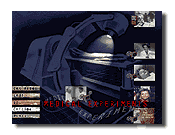
![]() I would almost call Public Shelter 'edutainment' but I can't bring myself to attach a cheesy catchword to such a unique disk. When you're marveling at the insanity of a clip with a 1950s housewife "washing" the radioactivity off of her food, for exampl
e, or the futility of a film that teaches children the "proper"way to react when the Big White Flash finally comes, the term "entertainment" just doesn't come to mind. Whatever it is though, it strikes a nerve.
I would almost call Public Shelter 'edutainment' but I can't bring myself to attach a cheesy catchword to such a unique disk. When you're marveling at the insanity of a clip with a 1950s housewife "washing" the radioactivity off of her food, for exampl
e, or the futility of a film that teaches children the "proper"way to react when the Big White Flash finally comes, the term "entertainment" just doesn't come to mind. Whatever it is though, it strikes a nerve.
![]() In the meantime, Ms. Loader is cooking up another project, a look at the Women's Air Derby of 1929 called Flygirls and keeping busy with a weekly column and
other projects. Public Shelter isn't shelved, though, as the disk lives on through it's website, providing up-to-date information on the world nuclear scene. It's crazy st
uff, this multimedia, because products can spawn a life of their own like some digital Frankenstein, hopping from the Web to disk and back again.
In the meantime, Ms. Loader is cooking up another project, a look at the Women's Air Derby of 1929 called Flygirls and keeping busy with a weekly column and
other projects. Public Shelter isn't shelved, though, as the disk lives on through it's website, providing up-to-date information on the world nuclear scene. It's crazy st
uff, this multimedia, because products can spawn a life of their own like some digital Frankenstein, hopping from the Web to disk and back again.
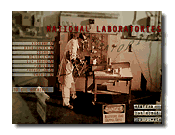
![]() Call it what you will, Public Shelter makes a great example of what the multimedia industry should shoot for - content, originality and a killer presentation. Disks like this just don't come out of nowhere, so if you're looking for a great application to
engage both your computer and your brain, find some Shelter.
Call it what you will, Public Shelter makes a great example of what the multimedia industry should shoot for - content, originality and a killer presentation. Disks like this just don't come out of nowhere, so if you're looking for a great application to
engage both your computer and your brain, find some Shelter.
Links:
Public Shelter Website
Public Shelter, the disk, Main Page
About the CD
WWWench, Loader's Weekly Column.
